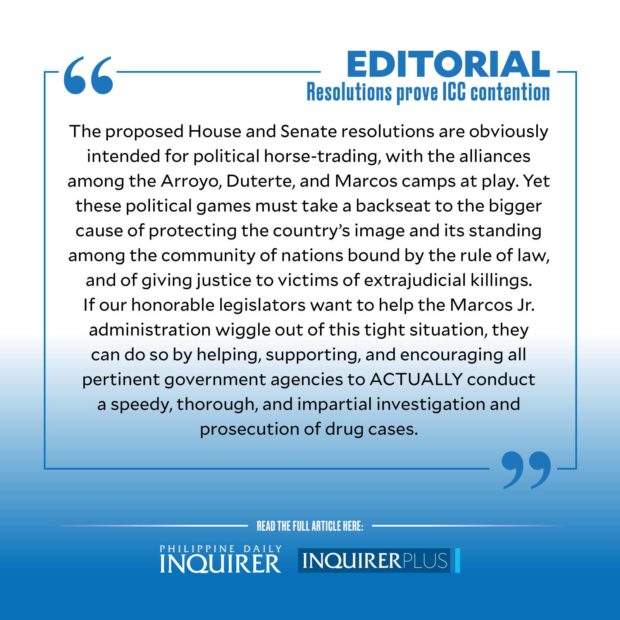Resolutions prove ICC contention
 Twin resolutions filed in the Senate and the House of Representatives last week were undoubtedly music to the ears of the first Philippine president to ever face investigation by the International Criminal Court (ICC), for crimes against humanity in connection with the thousands killed in his brutal drug war.
Twin resolutions filed in the Senate and the House of Representatives last week were undoubtedly music to the ears of the first Philippine president to ever face investigation by the International Criminal Court (ICC), for crimes against humanity in connection with the thousands killed in his brutal drug war.
“Be it resolved, as it is hereby resolved, that the House of Representatives declares unequivocal defense of former president Rodrigo Roa Duterte, the 16th president of the Republic of the Philippines, in any investigation and/or prosecution by the ICC,’’ said a resolution filed by 19 members of the House, led by Senior Deputy Speaker and former president Gloria Macapagal Arroyo. A Senate resolution filed by Sen. Robinhood Padilla, echoed the very same words.
Saying that the Philippines has a “functioning and independent judicial system,” the resolutions rejected the investigation by the Hague-based tribunal.
Article continues after this advertisementThe resolutions were filed after ICC prosecutor Karim Khan on Feb. 16 asked the tribunal’s Pre-Trial Chamber (PTC) to authorize the resumption of its investigation on drug killings between Nov. 1, 2011 and March 16, 2019. He said the Philippine government “has not provided any argument substantiating its request” for another extension. The ICC has suspended the probe in November upon the Duterte administration’s request, but the PTC authorized Khan to resume it on Jan. 26.
The PTC, in its decision, said it was “not satisfied that the Philippines is undertaking relevant investigations, or is making a real or genuine effort to carry out such investigations and any subsequent criminal prosecutions.”
The PTC’s conclusion was seemingly and ironically confirmed by the resolutions filed in both legislative chambers declaring “unequivocal defense” of Duterte and “strong opposition” to the ICC’s probe. They are counterintuitive and damaging to the country’s efforts to prove that our judicial system is indeed working.
Article continues after this advertisementAt the very least, this staunch defense is premature, given the Department of Justice’s (DOJ) slow investigation of the drug cases. Last year, the DOJ released information on 52 cases involving over 150 police officers found to be directly liable for the killings of drug suspects. To date, only four of these 52 cases have been filed in court.
This is a drop in the bucket. Officially, 6,252 were killed during the drug war from July 2016 to May 2022, according to the Philippine Drug Enforcement Agency. Human rights groups have however said that as many as 30,000 people were killed in the Duterte administration’s campaign against illegal drugs.
With such a dismal rate of prosecution, the least our lawmakers can do is to refrain from making statements that will further impugn the credibility of the DOJ investigations by prematurely proclaiming the innocence of certain parties involved in the bloody drug war. If they pronounce Duterte innocent at this early stage, they will only inadvertently validate the ICC’s contention that the Philippines is not only unable, but also unwilling, to prosecute those responsible for the unprecedented killing of drug suspects by the police acting under the officially sanctioned “Oplan Tokhang.”
It is an anomaly that, to date, government officials of the previous and current administrations have yet to apologize for the carnage they had abetted, or empathized with the grieving families left behind. It is this complicit silence that has precisely led the victims’ families to seek justice elsewhere, in this case, before the ICC.
The proposed House and Senate resolutions are obviously intended for political horse-trading, with the alliances among the Arroyo, Duterte, and Marcos camps at play. Duterte was recently proclaimed an adopted son of Arroyo’s Pampanga bailiwick. Arroyo also officially endorsed in the May 2020 elections the tandem of Ferdinand Marcos Jr. and Duterte daughter, now Vice President and Education Secretary Sara Duterte, who ran under Arroyo’s political party.
Yet these political games must take a backseat to the bigger cause of protecting the country’s image and its standing among the community of nations bound by the rule of law, and of giving justice to victims of extrajudicial killings.
If our honorable legislators want to help the Marcos Jr. administration wiggle out of this inherited problem, they can do so by helping, supporting, and encouraging all pertinent government agencies to ACTUALLY conduct a speedy, thorough, and impartial investigation and prosecution of drug cases.
The alternative is really embarrassing, if not inevitable. As former Supreme Court chief justice Artemio V. Panganiban wrote in his column for this paper, if the PTC allows Khan to continue his investigation and issues arrest warrants for Duterte and his officials, “our country’s reputation would be severely tarnished. … It would be mercilessly debased and numbered among failed African states, which have been ICC’s prowling grounds.”
That would indeed be a nightmare.
















